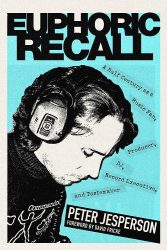 Music industry memoirs tend to fall into a pattern. Following the record/tour/record treadmill is almost inevitable for an artist, which means that often the best books come from those who stand outside the band, but still within the blast radius of the goings on that surround the music biz life. Being a sucker for a business book as well as a music book I find biographies like the recent one on Charisma Records head Tony Stratton-Smith fascinating, and here we have one that’s direct from the source.
Music industry memoirs tend to fall into a pattern. Following the record/tour/record treadmill is almost inevitable for an artist, which means that often the best books come from those who stand outside the band, but still within the blast radius of the goings on that surround the music biz life. Being a sucker for a business book as well as a music book I find biographies like the recent one on Charisma Records head Tony Stratton-Smith fascinating, and here we have one that’s direct from the source.
Peter Jesperson cofounded Twin/Tone Records, which launched such the careers of The Replacements, Soul Asylum, Babes In Toyland, and The Jayhawks amongst others. From 1999 he was instrumental in the A&R aspects of New West Records where he stayed until New West relocated to Nashville in 2016.
New West quickly became known as a roots music label, but Jesperson tells us that this was almost accidental, despite early signings being Billy Joe Shaver, Tim Easton, and The Flatlanders. The behind-the-scenes activity which brought Vic Chestnutt to the label are interesting. His career arc with New West is done within about 4 pages, from being a target for Jesperson to recording the albums ‘Silver Lake’ and ‘Ghetto Bells’ to being let go by the company as, “he would be better off with a smaller, boutique label that could devote more attention to his music”.
The early part of the book follows his path from music fanatic in Minneapolis in the mid-70s, through setting up Twin/Tine while working at record store Oar Folkjokeopus, a hangout for many local artists. From there he progressed to managing The Replacements. Chris Mars of the band says of Jesperson: “His enthusiasm kept us going at times, definitely. His vision, his faith in the band was a binding force.” The Replacements ended up releasing both the first and last albums on Twin/Tone.
From there we have chapters on his time as road manager for R.E.M, and then back with The Replacements. His most emotive writing comes on the pages devoted to his firing by the latter band in 1986. While he is honest enough to say he “had made myself dismissible with my excessive alcohol consumption,” he also analyses his and Paul Westerberg’s approaches to business. Jesperson never comes across as quite the hardheaded operator that someone like Joe Boyd does, he clearly has the business acumen to see why he may simply have been too close to The Replacements to be the right person to guide the next phase of their lives.
One reviewer criticised ‘Euphoric Recall’ for being a typical “attendance roster with all the name checks” type music memoir. I’m not sure what book they were reading because for me that is exactly the trap that Jesperson avoids. The chapter on his substance abuse and subsequent redemption, which led to his move to L.A. with his wife is much like anybody else’s, but still worth reading as little anecdotes pop up here as they do all through the book. Interesting connections are made from early in his career to more recently. One of my favourite albums of the last decade or so is ‘How the West Was Won’ by Only Ones’ singer Peter Perrett. Jesperson interviewed Perrett for its release in 2017 for KEXP, and it’s one of the most inciteful interviews you’ll find with any artist. That connects back to The Only Ones playing a club Jesperson DJ’d at back in 19678 and The Replacements cover of ‘Another Girl, Another Planet’.
It’s those fan moments that make this book so engaging, and Jesperson such a vital figure in the promotion of so much great music over the last 50 years.
From their last Twin/Tone album, ‘Let It Be,’ this is The Replacements heading into Power Pop land and their later albums for Sire.
Jepserson speaks fondly of the Jayhawks, whose ‘Blue Earth‘ was released by Twin/Tone. 20 years later, in another of those long term connections, Louris and Olson recorded this for New West.
I’ll take any excuse to get this song out to a wider audience…



